
You will never have more time than you have right now.

This pandemic makes for an interesting time to be working. Unless you are an essential worker, you are likely working from home. The transition seemed to happen fast and is lasting longer than what you might have imagined.
My husband’s firm said they will not return to their offices until early 2021. That was a big surprise to him and to me!
Whatever your situation, how you coping?
This can be a time to practice feeling what it might be like to “retire.” Even though I say, “I am out to retire the word “retirement.” You are not retiring, but you are moving onto something else. And it takes time and intentional thought to know what’s next for you.”
When you leave your career, you don’t retire from life. I follow Joseph Coughlin who leads the Massachusetts Institute of Technology AgeLab (agelab.mit.edu). He says on average, you will have 8,000 days after 65. Other authors talk about how retirement can last 30 years.
What do you want to do with these days?
How do you want to spend these years?
During this pandemic, many organizations and entrepreneurs are thinking about a different business model. What worked before may not work again. The title of executive coach guru Marshall Goldsmith’s book What Got You Here Won’t Get You There. rings true.
Some of you are realizing you want to keep working. Working remotely some of the time adds flexibility and people aged 60+ desire more freedom.
Others of you may feel like this pandemic is the perfect time to retire–to let go in order to move on. The hassle of all of these changes may not be worth hanging in there much longer.
Regardless of which camp you fall into, now is always the time you should be thinking about what’s next for you.
What do you want your legacy to be?
Since you never know when the end will be, every day is a chance to get it right.
Ben Hardy blogs about life and his wisdom is worth reading. I am reviewing his latest book Personality Isn’t Permanent. His research and insights are interesting because they often go against what is thought or even taught.
Hardy shares this:
Despite turbulence and other conditions keeping airplanes off-course 90 percent of flight time, most flights arrive in the correct destination at the intended time.
We can use flight as an analogy for living. “Even seemingly inconsequential aspects of our lives can create ripples and waves of consequence — for better or worse.”
Hardy asks these questions:
How are you piloting your life?
What feedback are you receiving to correct your course?
How often do you check your guidance system? Do you even have a guidance system?
Where is your destination?
When are you going to get there?
Are you currently off-course? How long have you been off-course?
How would you know if you are on the right course?
How can you minimize the turbulence and other conditions distracting your path?
As you go through life’s ages and stages, these are great questions to be asking yourself along the journey.
COVID-19 has taught us many things. But one thing has become more clear–there is a fine line between life and death. We don’t know when the end will come. Time is all we have and it is our most precious resource.
Are you living the good life?
This is how Richard Leider defines the good life:
“Living in the place you belong, with the people you love, doing the right work, on purpose.”
Are you really preparing for retirement, for what it is, an entirely new life stage? Coughlin wants us to think about these questions:
- Do you have a bucket list that doesn’t last only for weeks or months, but one that lasts for decades?
- Do you know what will get you up for what is likely to be 8,000 distinct mornings in retirement?
- How will you provide care to a loved one – and have you put into place your own care plan for older age?
If you want to know more about what I think about this pandemic, you can watch an interview with Paul Long (ProBoomers) and me (6 minutes). Click here. My Breadcrumb Legacy concept might be just for you!
 Sign Up and Download Your FREE Copy of The Top 5 Actions For Creating Your Own Breadcrumb Legacy™
Sign Up and Download Your FREE Copy of The Top 5 Actions For Creating Your Own Breadcrumb Legacy™
